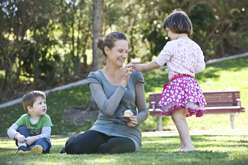Want nicer kids? Coach tots to self-regulate

(Medical Xpress)—Parents struggling to tame their temperamental toddlers take note: There's now concrete proof that your hard work will pay off.
Australian-first research by QUT has found toddlers who are taught self-control go on to become nicer six year olds.
And the best news is, even the most terrible two year olds can benefit from this coaching.
"The temperament your very young child is born with is not their destiny," QUT Faculty of Education PhD researcher Kate Williams says.
"Recent research shows that even highly reactive children can be taught positive behaviours. So if you only do one thing, coach self-regulation with your child."
QUT early childhood researchers looked at what "self-regulation" skills toddlers had at two and three years of age and then compared the results to their level of "prosocial" behaviour as six-year olds. Those tots whose mums said they could self-regulate showed solid levels of prosocial behaviours four years later. (See definitions, below)
Ms Williams says any move to teach very young children to self-regulate is worth the effort, even if your toddler is particularly challenging.
"We are all born with a temperamental profile which is more or less reactive to things around us when compared to other people," Ms Williams said.
"Reacting in itself is not a problem, it's the skills we learn to deal with those reactions that are important.
"A baby is a completely reactive creature. Parents act as their regulator, soothing them when they cry, changing their nappy when they are uncomfortable, feeding them when they are hungry, telling them it is time to sleep by putting them in the cot.
"By the time we are adults, we have learnt to do all these things for ourselves, and most of that learning happens before we are eight.
"Self-regulation comes with practice, not just maturity. So every meltdown and painful toddler moment is a great learning opportunity. Without these moments that drive us nuts as parents, there would be no chance for children to try out those important self-regulation skills."
The findings, co-authored with Professor Donna Berthelsen, were published in the Proceedings of the 14th Annual Conference of the Pacific Early Childhood Education Research Association, by the Ewha Woman's University, Seoul, earlier this year. Read the paper, here.
What is self regulation: Self-regulation is the ability to adapt your emotional, physical and mental state to a task or situation. In a two-year-old, that means being able to calm down during a crying episode, do a simple task that they are asked instead of going to play first, or concentrating for an age-appropriate amount of time when someone reads them a book.
What is prosocial behaviour: Prosocial behaviour means acting in a way that benefits other people, such as showing empathy, sharing, volunteering and other things which are not done for selfish reasons. Being prosocial means you will have friends and fit in to society, and are less likely to suffer from mental health issues.
How to coach self regulation with kids:
Use the outburst
If your child is having a strong emotion, tell them it's OK to feel the way that they do. Give them some words to use next time, such as saying "I can see that you are angry" or "It's OK to feel sad about daddy leaving", or "You must be annoyed that that Lego block won't go on". Suggest ways they could solve their emotional dilemma, such as "To calm down, go into the back yard and run around", or "Daddy will be home soon. Let's make him something special to eat for dinner", or "Put the Lego block down, take a deep breath, and try again". If that doesn't work, try distracting them with something different. Try not to get upset yourself.
Model good behaviour
When you are angry, sit down and say something like "I am too angry to talk to you right now. I just need to take some deep breaths and sit here a minute and then I will talk". And then do what you say. Stay calm in tough situations. Don't hide expressions of emotions, such as crying, but instead explain why you feel the way you do and how you will make yourself feel better.
Keep their attention
Teach your child to remain focussed on tasks for an age-appropriate time, such as playing a game or listening to a book being read to them. If they get distracted, regain their attention by repeating what you are doing and inviting them to join in. "Toby, we are reading a book. When we are reading a book we sit down and listen. You can play with your Lego later." This will take persistence and will come with time, but don't make reading time a chore.
Read to them
Not only will it help with their attention span (see above), book reading can be a chance to discuss emotions. Talk about the expressions on the faces of the characters, and the reactions of the characters to situations in the book. "Oh, look, Thomas is sad because Henry won't talk to him. (Make a sad face like Thomas)." "Oh, look, Thomas is happy now because he is going on the track. (Make a happy face like Thomas)."
















